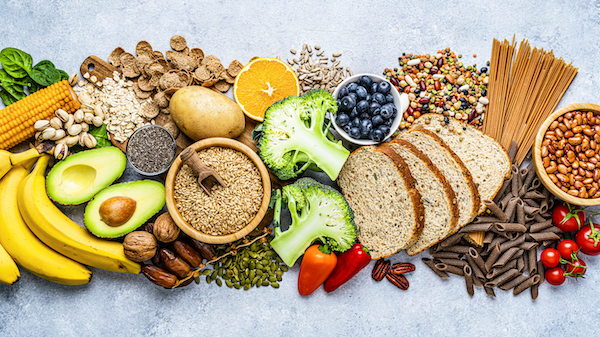As more and more women are discovering they have food allergies or sensitivities, Dr. Susan E. Brown, PhD and Dr. Sharon Stills, NMD share their insight about the causes and solutions with Kate, nurse-educator at Women’s Health Network, in the video and edited transcript below.

What’s the difference between a food allergy and a food sensitivity?
Kate: I want to start by making the distinction between a food allergy and a food sensitivity. I think those terms are used interchangeably by a lot of people. Is there a difference?
Dr. Stills: Definitely! A true food allergy is mediated by the IgE section of the immune system. That is the kind of thing where you eat a strawberry and you have an anaphylactic attack. You can’t breathe or your eyes and lips are swelling. That’s a true medical emergency.
A food sensitivity is more of a delayed reaction. It’s moderated more by the IgG portion of the immune system. It’s not going to be so acute. But it is going to cause a lot of havoc in your body and create certain health conditions that you might not even think are related to foods that you ate.
Dr. Brown: You can have food sensitivities that are not mediated by the immune system. You can also have food sensitivities that are digestive. For example, you don’t have the enzymes that you need to digest a particular food. People who are milk intolerant may lack a certain enzyme.
80 percent of all food allergies are delayed reactions
Kate: For the purposes of our conversation today I think we’re really referring more to food sensitivities. If you have a food allergy, chances are you’re well aware of that.
Dr. Brown: Well, there’s a problem in that many food allergies are delayed. In other words, we think of an allergy like Sharon explained — as the immediate response. You go into a room, you smell a cat, you get a headache and you get hives. But 80 percent of all allergic or hypersensitivity reactions are delayed — and they can take up to four days.
It’s a little confusing. You might say “Gee, I had corn today and I’m fine.” But in a couple of days you’ve got this wicked headache back again.
For many years I have used tests that can uncover a wide range of delayed immune responses and these delayed reactions often underlie autoimmune disease and other serious inflammatory illnesses.
Kate: This is important for people to know. Even with all the food journaling in the world, it’s hard to identify what your triggers are if the response is delayed for several days.
Dr. Brown: This is when an elimination diet is helpful. Here the idea is to eliminate suspected foods for at least four days. This gives the body a chance to “clear” the substance. Then after avoiding these foods for four days, you reintroduce the food over the next four days. Often a previously unrecognized reaction becomes obvious with the simple elimination/challenge procedure.
What are the most common trigger foods?
Kate: There’s a commitment involved to figuring out where your sensitivities lie. What are some of the more common trigger foods or challenging foods for people? Maybe they know something’s wrong, but they don’t really know where to start.
Dr. Stills: That’s an easy one! Gluten and dairy are the biggies that I see with patients. I do a lot of blood testing. There are certain alternative labs where we can test the white blood cell reaction so we can see by testing the antigens of the food if there’s an agglutination — which means is it getting sticky, are the white blood cells sticking to it and clotting?

But if you don’t want to spend the money or you don’t like having your blood drawn, I can get a lot of information from looking at someone’s intake and a food diary. You can see if they’re always eating dairy.
We’re often addicted to the foods that we’re allergic or sensitive to. If you’re told you have to give up dairy and if you go into shock or panic or anxiety, chances are you’re probably addicted to it.
Soy is also a big one, as are eggs, shellfish and sometimes nuts. I really love nuts and eggs, and I think there’s a lot of benefit nutritionally. So we want to make sure there’s really sensitivity before we take them out of the diet.
I have seen when you take gluten or take dairy out that probably 80 percent of your problems are going to go away.
I test for around 200 foods and patients can come back with sensitivities to up to 70 foods. These can even be foods that are superfoods like apples, blueberries and broccoli.
But when I see that, it doesn’t necessarily mean you have sensitivities to everything. It means that the gut is leaky. The junctions are not tight and foods are passing through when they shouldn’t be. The white blood cells are attacking and you’re having that immune reaction. You’re going to be sensitive to a lot of things.
We have to remember when we’re dealing with food sensitivities that we also have to go back and heal the gut — seal up the gut that’s leaking — and then the sensitivities will diminish as well.

How important is allergy testing?
Kate: Is allergy testing something that we really should be recommending or is it okay to start with the foods?
Dr. Stills: It really depends on what kind of person you are and how you want to go about doing things.
Some of us like to do a test, we like to get the written word, we like to see a printout — and it inspires us and it motivates us. If that’s what you need then I recommend doing some sensitivity testing.
Others of us would rather just make our bodies a laboratory and take out the top eight offending typical things — such as soy, dairy, gluten, eggs, corn and so forth. Just do the experiment for a month. It’s free, so you’re saving money. And then you can add the foods back in one at a time.
My experience with thousands of patients has been they typically end up feeling so good that the majority of them say, “I found substitutes. I don’t even want to add anything back in.”
You can always choose to add a food back into your diet
Dr. Stills: If there’s something you really want to add back in you can try it and see how you do. At the end of the day you get to make the choice. When you add it back in do you get a runny nose or your skin flares or your joint aches or your migraine shows up? You can correlate and say, “Dairy is doing this to me.”
Maybe at some point you’re going to be staring at crème brûlée on the table and you’re going to think, “You know what? I’m willing to take one for the team. I’m going to have the crème brûlée and I know I’m going to suffer.” That’s your choice, but at least you have the knowledge and you can start making good decisions about what you do or don’t want to put in your body.
If you are going to choose the crème brûlée, then I say choose it with all your heart, all your body, all your cells and really enjoy it. Because there is something to the mind-body connection. Often if you’re eating something and really enjoying it, the immune system won’t go so crazy and you might not be so symptomatic.

You just have to remember not to go overboard. If you get away with something once, it doesn’t mean you can start having it every day. Because you’re going to end up in trouble again. The immune system is not going to put up with that.
Kate: It seems like everybody is sensitive to something now. What’s changing, or is it just increased awareness?
Dr. Brown: Sharon pointed out it has to do with gut permeability. You cannot have a hypersensitive immune response unless something’s getting in the blood that shouldn’t be there. And 90 percent of that something comes from the digestive tract.
Antibiotics are a major cause of leaky gut. Just one course of antibiotics can significantly disrupt the intestinal flora, reducing flora diversity and destroying beneficial flora. Then, of course, there is an increased possibility of Candida overgrowth, which itself worsens leaky gut. In addition, most of us lack adequate amounts of the many nutrients needed to repair and build intestinal tissues.
As a culture we Westerners only pay attention to digestion when a problem like irritable bowel diarrhea or allergy arises. Ancient wisdom-driven cultures such as China and India which have been around for thousands of years have deep traditions of food preparation, eating timing and styles, and other habits of living that support optimum digestion.
It’s also interesting to consider that our immune system, our white blood cells, are “thinking” decision makers and they are influenced by the state of our nervous system, just as is our entire body. When the white blood cell recognizes a foreign particle it asks, “Is this particle harmful?” and then decides if it will attack this particle or not.
When the white blood cells are nervous and jittery they are much more likely to attack a “harmless” particle (like a poorly digested food macromolecule) and attack it just as strongly as they would attack a deadly virus. On the other hand, if the immune system is relaxed and resilient it would gently soak up the food particle like a sponge. In this case you would have no allergic response. What I am saying is that many times our nervous system and our thoughts influence our digestive strength and our allergic responses.
Dr. Stills: The food that we’re eating is very refined nowadays and there’s an overabundance of GMOs (genetically modified organisms). When you go over to Europe where the food is fresh and it’s made with love and it’s not so processed, you can tolerate maybe gluten or maybe dairy that you can’t tolerate here.
Here I don’t eat dairy, but when I’m in Italy I exist on gelato. It’s kind of like breakfast, lunch and dinner — and I do fine. There’s something to be said about how we’re refining our food and the quality of it. I think that has a big part to do with why we’re seeing so many more sensitivities these days.
Kate: You can also be mindful of how and when and where you’re eating. I know for me it’s made a big difference just taking the time to chew my food more thoroughly. There are little actions people don’t even realize they’re taking that are very easy to correct.
 | Take our digestive health quiz to find out what’s going on with your digestion. |










